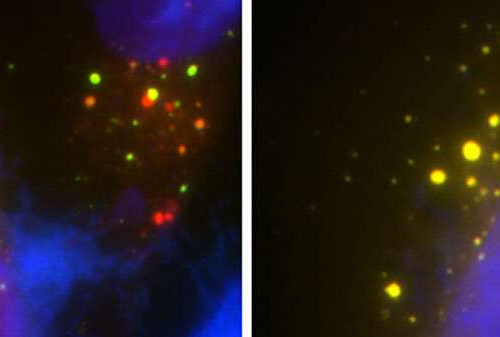by Deborah Kotz, University of Maryland School of Medicine Researchers at the University of Maryland School of Medicine (UMSOM) have identified how certain gene mutations cause amyotrophic lateral sclerosis (ALS), also known as Lou Gehrig’s disease. The pathway identified by the researchers may also be responsible for a certain form of dementia related to ALS....
Tag: <span>Mutations</span>
New research into stem cell mutations could improve regenerative medicine
New research from the University of Sheffield into stem cells could help make regenerative medicine safer Regenerative medicine involves using pluripotent stem cells to repair damaged or diseased tissues in the body The new research has suggested ways to reduce the likelihood of mutations occurring in these cells when cultured. Research from the University of...
Measuring Mutations in Sperm May Reveal Risk for Autism in Future Children
This news or article is intended for readers with certain scientific or professional knowledge in the field. Spontaneous mutations in paternal sperm are linked to autism spectrum disorder; researchers have developed way to quantify those mutations and assess chances the mutations will cause disease. The causes of autism spectrum disorder or ASD are not fully...
New clues as to why mutations in the MYH9 gene cause broad spectrum of disorders in humans
Researchers use in vivo imaging to watch how cells move and generate forces inside living tissues, study sheds new light on how motor proteins generate forces inside living tissues and how genetic factors alter these forces to result in disease COLUMBIA UNIVERSITY SCHOOL OF ENGINEERING AND APPLIED SCIENCE New York, NY–October 28, 2019–Myosins are motor proteins that...
Mutations in noncoding genes could play big role in regulating cancer, study finds
by Liz Ahlberg Touchstone, University of Illinois at Urbana-Champaign RNA transcribed from genes that seem not to code for anything may play an important role in regulating cancer, a new study suggests. A number of these noncoding RNA fragments lie next to known cancer genes, the study found. Understanding how they interact with those cancer genes could open new avenues to understanding cancer’s behavior and treating it. Led by Kannanganattu Prasanth, a University of Illinois cell and...
Mutations in trafficker protein linked to brain disorders.
Protein involved in the strengthening of synapses may have key role in neurodevelopmental disorders. Cerebellar purkinje cells with increased levels of ASTN2. Credit: Behesti et al. PNAS Communication between neurons is vital for efficient neural activity. This is highly regulated by the level of postsynaptic membrane surface proteins expressed, which adapts and changes in response...
Study cracks open the secrets of the cancer-causing BRCA1 gene
Lawsuits didn’t do it, public shaming didn’t do it, patients and doctors banding together to “free the data” couldn’t do it: For 22 years Myriad Genetics, one of the oldest genetic testing companies, has refused to make public its proprietary database of BRCA1 variants, which lists more than 17,000 known misspellings in that major “cancer risk” gene, along...
Family tree of blood production reveals hundreds of thousands of stem cells
Adult humans have many more blood-creating stem cells in their bone marrow than previously thought, ranging between 50,000 and 200,000 stem cells. Researchers from the Wellcome Sanger Institute and Wellcome—MRC Cambridge Stem Cell Institute developed a new approach for studying stem cells, based on methods used in ecology. Credit: CC0 Public Domain The results, published today (5...
Mutations, drugs drive cancer by blurring growth signals
Novel technique lets researchers control common cancer pathway in the lab with pulses of light, revealing the hidden importance of precise timing in cellular signaling UNIVERSITY OF CALIFORNIA – SAN FRANCISCO Genetic mutations in a form of non-small cell lung cancer (NSCLC) may drive tumor formation by blurring cells’ perception of key growth signals, according to a...
Stabilizing dysferlin-deficient muscle cell membrane improves muscle function
In experimental model of LGMD2B, vamorolone improves and prednisolone worsens myofiber repair CHILDREN’S NATIONAL HEALTH SYSTEM WASHINGTON-(Aug. 27, 2018)-Healthy muscle cells rely on the protein dysferlin to properly repair the sarcolemmal membrane, a thin specialized membrane that serves a vital role in ensuring that muscle fibers are strong enough and have the necessary resources to...

